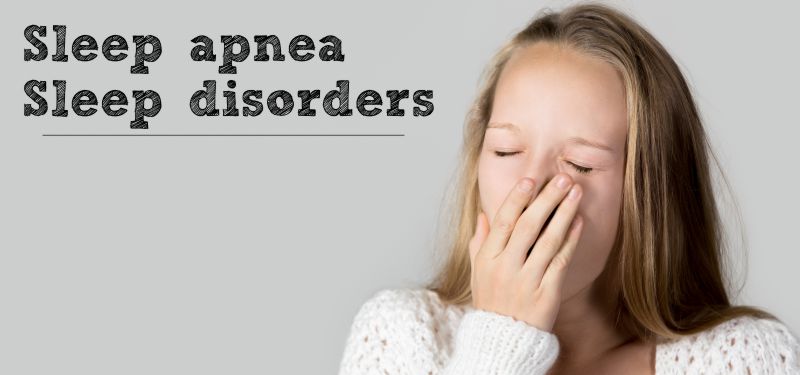There are some 18 million people in America alone that suffer from some form of sleep apnea, a sleep disorder that causes people to stop breathing during the night. Apnea comes from a Greek word that stands for “want of breath”. The periods of breathlessness usually lasts from ten to thirty seconds and can occur just a few times to several hundred times a night. The main cause is that the throat muscles become too relaxed during sleep and constrict the airways.
Many do not even know they suffer from this condition, in fact, 2 out of 4 people do not realize they are sleep deprived due to sleep apnea. Those who have this condition are at a greater risk of suffering from various other ailments, everything from strokes to diabetes. These periods of oxygen deprivation can have both short-term effects (migraines, extreme fatigue) and long-term effects (stroke, heart disease).
1. Overweight and Lack of Exercise is the Main Cause

Most find their problem clears up or is greatly improved when they lose weight. One of the easiest and healthiest ways to lose weight is by eating just fruit from morning till noon, and then eating healthy and nutritious meals for lunch and dinner. It’s extremely important to avoid processed, sugar-laden and deep fried foods which are known to trigger a host of health problems (See Food Chart with this report).
Exercise four times a week. By doing moderate exercise for about 40 minutes has been shown to significantly improve sleep apnea and helps to reduce the feeling of being tired all the time. Using a medicine ball you can follow along with a trainer on YouTube doing several stretching exercises. A Mini Trampoline offers a safe and effective workout. A good brisk 20 or 30 minute walk every day is also a must for good health and better sleep.
2. Sleep on your side instead of your back

When you lie on your back you encourage the throat muscles to close up, and your tongue to fall towards the back of your throat. By simply moving to your side, you can reduce this discomfort and potential apnea episodes. Also, reducing the number of pillows allows the neck to rest at a more natural angle, which will help your chin not to be pushed towards your chest restricting your airways.
3. Vitamin D and C + Anti-Oxidants

Sunbathing without using suntan lotions is an excellent source of Vitamin D. Sun tan lotions are loaded with dangerous chemicals and are not needed because you should only expose your skin to the sun for no more than 20 minutes a day (10 minutes on your front and 10 minutes on your back). Vitamin D is absorbed through the cornea and the skin on our faces is thinner than the skin on the rest of the body so it is best to wear a hat or cap that will protect the face but not use sunglasses if you can stand the light.
You will need to build up your resistance gradually as someone that has not been in the sun much could get sunburned in 10 minutes at the peak hour of the day.
A study from the American Journal of Respiratory and Critical Care Medicine found that vitamin C can reduce the damage of sleep apnea. High vitamin C foods include bell peppers, dark leafy greens, kiwifruit, broccoli, berries, citrus fruits, tomatoes, peas, and papayas.
4. Magnesium the ‘Master’ Mineral

Magnesium is connected to the heart, disease prevention, and mental health and it is often the mineral missing the most in the wellness equation. Magnesium is a mineral that is vital to muscle regulation. Because apnea is a problem with the muscles of the upper throat ensuring you have enough in your diet is crucial. Buying foods from your local farmers market and foods that are grown organically may have higher levels of magnesium. Typically, the foods you’ll find that have the highest amounts are green leafy vegetables, which are also packed with chlorophyll.
Chlorophyll is known as the “lifeblood” of a plant. You can find liquid chlorophyll in most health shops. Start off by drinking 1 glass (250ml) per day for 1 week and that should make a noticeable difference and then consume 2 tablespoons per day for maintenance. Spinach, Chard, Pumpkin seeds, Yogurt or Kefir, Almonds, Black Beans, Avocados, Figs, Dark Chocolate (avoid brands with white sugar) and Bananas all provide high amounts of Magnesium.
5. Herbs, foods and potent natural medicine for better sleep

- With 1 teaspoon of olive oil (or organic honey) add 3 drops of Lavender essential oil and consume just before bedtime.
- Look for Serotonin precursor 5-HTP as decreased serotonin levels can cause the sleep disorder. It works in conjunction with Magnesium.
- Omega 3 has been the cornerstone of the Dr. Johanna Budwig protocol of flaxseed oil and cottage cheese for combating cancer and some 50 other common diseases. Another pure source of Omega 3 is found in Krill oil. Omega-3 fats are one of the top natural remedies for sleep apnea because they protect cells against stress. Sleep apnea causes long-term oxidative stress and puts severe demands on the body which is thought to deplete the omega-three levels.

